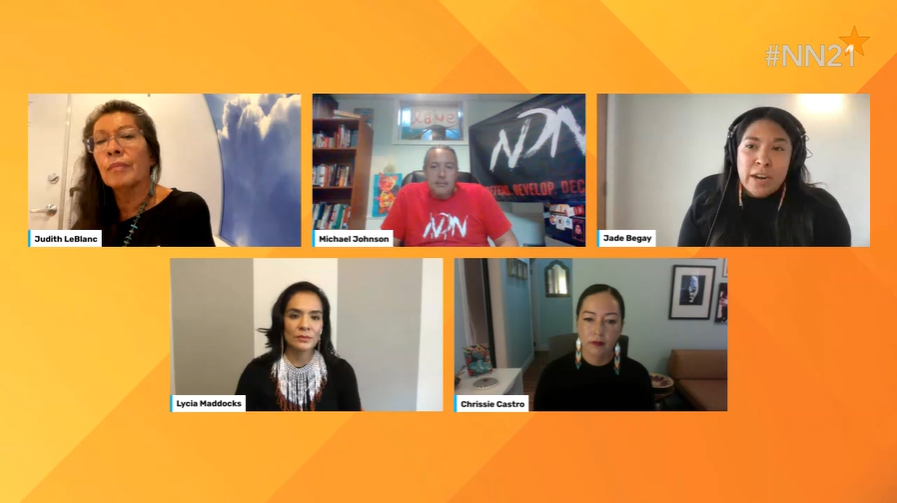During one of the afternoon sessions at Day One of Netroots Nation 2021, a panel of Native American organizers and leaders gathered via Socio and Zoom to discuss the issues facing Indigenous voters, and how they are preparing for the upcoming 2022 midterm elections going forward.
The panel featured Judith LeBlanc, member of the Caddo Nation of Oklahoma and Director of Native Organizers Alliance; Chrissie Castro, Diné and Chicana, and Chairperson of the Los Angeles City and County Native American Indian Commission; Jade Begay, Diné and Tesuque Pueblo of New Mexico and Creative Director of NDN Collective; and Michael Johnson, citizen of The Three Affiliated Tribes of North Dakota, and Director of Advancement with NDN.
The discussion was moderated by Lycia Maddocks, Citizen of the Quechan Indian Nation and communication strategist with NDN Collective.
The panel started off with panelists discussing the challenges facing Native voters and organizers, and some of the lessons learned from the 2020 election.
One of the frustrations for Indigenous organizers is that Native Americans have historically been dismissed as a key electoral constituency. LaBlanc said that an ongoing narrative around Native American voters is that they are “statistically insignificant,” and therefore not worthy of campaign attention.
“But,” she said. “They are politically significant.”
She noted that the Navajo Nation already has one of the highest voting rates, a number which only increased during the 2020 election.
Begay concurred with this sentiment.
“There are demographics who don’t believe our vote matters,” she said–an issue that demands attention from Democrats. One way to address this, she continued, was to get Native-centered narratives in the mass media.
Maddocks then turned to LeBlanc to elaborate on her observations on the conditions in both rural and urban Native communities.
LeBlanc said that the key to mobilizing the vote was to not only bring awareness to the growing political power of Native voters, but to instill that awareness as a call to action.
She cited her success in organizing across seven different states against the growing tide of extremist right wing candidates running for state legislative seats.
“We said look,” she said. “Election results are snapshots of our political power at the moment. They’re snapshots of their political power as well.”
Another motivating factor will be the presence of Deb Haaland, an enrolled member of Laguna Pueblo of New Mexico, Secretary of the Interior, and the first Native American to serve as a Cabinet secretary.
The panelists overwhelmingly agreed that the importance of Secretary Haaland’s presence in the cabinet cannot be underestimated.
The panelists mentioned that are “persistent barriers” for communities, barriers which are systemic and thus in need of legislative action.
Examples of solutions include the Native American Voting Rights Act.
There is also the matter of visibility. One panelist mentioned that 80% of Native voters base their voting decisions on the track record of a candidate’s support of Indigenous issues. If progressives are to earn the Native vote, they must continue to engage Native voters and speak to issues that engage Native voters, such as environment, education, sovereignty, and the right to self-determination.
LeBlanc noted that tribes have a unique relationship with the federal government because they are sovereign nations with treaty rights.
Additionally, the Bureau of Indian Affairs shares the same budget apportioning funds towards other environmental issues, such as endangered animals, leading to an underfunding towards issues such as education.
And though there has been an expectation since the Clinton administration that tribes be consulted in policymaking, she said that historically their requests and concerns have been ignored or merely given lip service.
“Organizing is being at the table,” she said. “There is an executive order requiring consultation.” But until it’s mandated, nothing will fundamentally change.
Begay also noted that, in addition to issues such as food sovereignty and environmental justice, there needed to be a greater investment in cultivating Indigenous leaders.
Maddocks then asked the panelists how they were preparing Native candidates for the 2022 midterm elections.
Castro said her organization was “investing in working on representation” through focus groups, campaign management teams, and building political infrastructure.
Talking to voters about issues they care about and activating in every election and political avenue — “school districts and council meetings” — helps “[build] a muscle of Native voter participation for 2022.”
Creative strategies employed to work with the restrictions imposed by the global COVID-19 pandemic, such as robust phone banking and digital organizing, only strengthened those connections.
Maddocks ended the panel by agreeing with this statement. For Native organizers and communities, in her words: “Voting is sovereign muscle.”

